In today’s digital world, finding information about anyone is easy. But how reliable that information is? That’s where TruthFinder comes in. It is an online background check service that compiles data from public records, social media, criminal databases, and more to give users a detailed report about someone.
Whether you’re reconnecting with an old friend, screening a potential roommate, or just curious about who’s contacting you, tools like TruthFinder can be handy.
But with so many data brokers and people-search platforms out there (a data economy often discussed in statistics of shadowy corners of the internet), it’s natural for one to wonder: Is TruthFinder legit and safe?
While TruthFinder provides access to public information, the way you use it matters, and there are clear rules and limitations you need to know before relying on it as your go-to people search tool. This article provides extensive insight into what TruthFinder is, if it is legal, how to use it, and more.
What is TruthFinder?

TruthFinder is a popular people search engine that gathers information from public records about someone and turns it into easy-to-read background reports. But unlike a Google lookup, TruthFinder is not free; it works with a subscription. Think of it as a powerful paid search tool that helps you do the heavy lifting.
It pulls up information from various sources:
- Criminal histories and court records.
- Social media profiles and photos.
- Property ownership records.
- Marriage and divorce records.
- Phone directories.
- Sex offender registries.
- Contact information and address history.
- Education and employment history.
- Financial information (liens, bankruptcies, etc.).
Each of these sources will only contain bits and pieces of information about the person you are trying to look up. The goal is to compile these scrambled bits of information into a single “background report” that you can easily read.
Unlike free search engines (like Google) or anti-profiling (private) search engines that will only give you bits and pieces of information and let you do the gathering and putting together, TruthFinder will do all the work. It’s pretty convenient, especially if you are trying to piece someone’s background together without having to spend hours digging through web pages.
The company’s headquarters is in San Diego, California. It was started in 2015 and has already processed millions of searches since it started.
TruthFinder does its job pretty fast, pulling up a person’s info into a full background report in minutes. Also, in this AI-driven era, the platform seems to represent a positive use of AI, leveraging it to connect, inform, and protect its users. But the real question remains: How well does it work, and how does it actually function? We’ll explain that in a later section—but first, let’s address the most pressing question.
Is TruthFinder legit or a scam?
Now that you have come across TruthFinder, it’s time for the important question: Is TruthFinder a legit website or not? It’s quite impressive how quickly this tool pulls up someone’s entire history online, so you might be wondering if it’s legal. Well, the short answer is yes, TruthFinder is a legitimate tool; it’s not a scam.
But this isn’t enough, right? It is a real service that has been providing almost accurate information since 2015. Also, its business model is legal because it mainly uses data that is already publicly available.
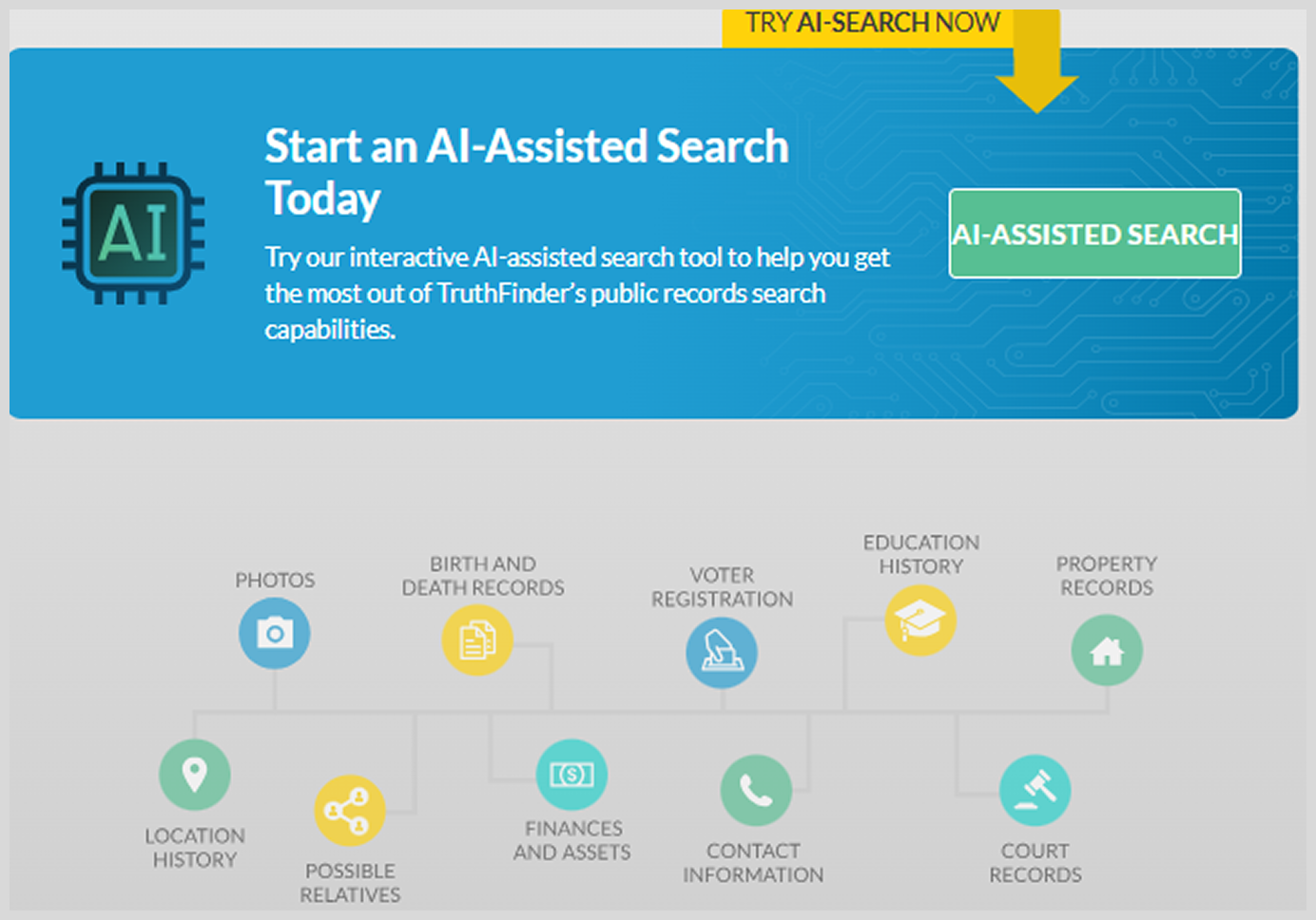
The only thing is that you can’t find this info by doing a simple Google search because it’s in court documents, government databases, and other public archives. TruthFinder does it all for you.
What makes TruthFinder legitimate?
There are a lot of reasons prove that TruthFinder is not a fly-by-night operation. Let’s take a look at them below:
- Real company with physical presence: It has physical offices in San Diego and has real employees, not just a P.O. box somewhere.
- Actual data sources: The info TruthFinder compiles comes from legit public records, not made-up details.
- Transparent billing practices: Though their pricing is not really cheap, they clearly outline the terms of their subscription and costs before you commit.
- Years in business: No company running elaborate scams can survive for up to a decade under regulatory scrutiny, and TruthFinder has been in business since 2015. They’ve been at it for 10 years now. That should count for something, right?
- Customer service: They have real support teams that handle your inquiries (although the quality of response may vary).
However, being “legitimate” doesn’t mean that it is “perfectly safe” or “100% accurate.” There are still some important fine prints you need to know before you go ahead and hand over your credit card information to TruthFinder.
How does TruthFinder work?
TruthFinder is not a magic crystal ball (like any other tool available today). In fact, think of it more like an automated librarian that is very thorough in their job. It is designed to scan through the digital world for pieces of a puzzle and put the pieces together for you.
Here is a step-by-step process of how TruthFinder works, from your search to the final report:
Step 1: Initiate the search
It all starts with you. You give it a name you want to search and, ideally, a location (if available) to help narrow down the possibilities. TruthFinder may also ask you some optional questions about possible relatives or known cities (it asked middle names and area codes from most of our testers). Its search and focus become more precise when you provide more details about who you want to investigate.
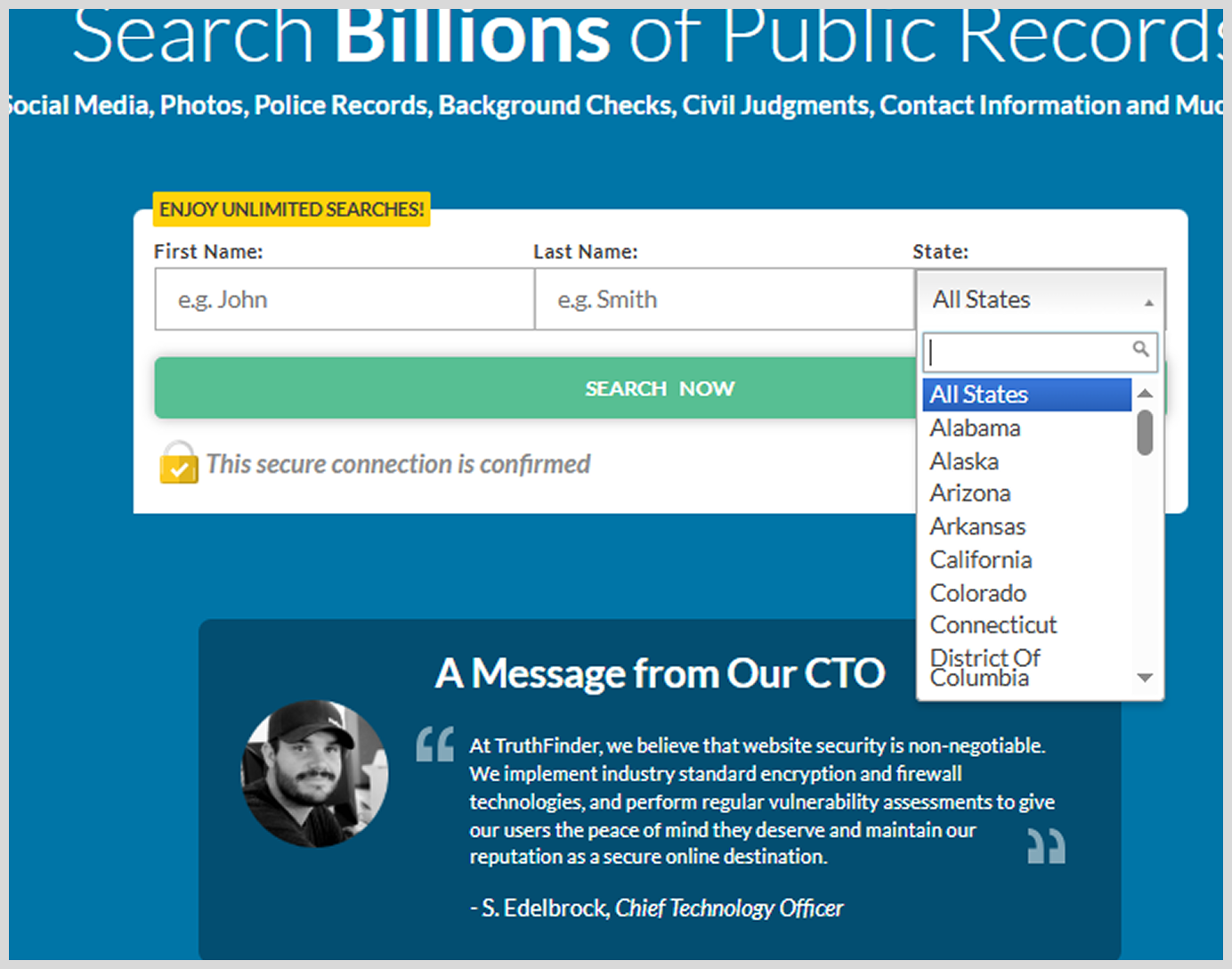
Step 2: It starts searching
When you click “search,” TruthFinder starts its search using its algorithms. It does the work fast, scanning through mountains of public records and databases. (We got our target’s full background reports within a couple of minutes while testing.) The algorithm looks up lots of things, like court records, social media profiles, phone directories, etc., to find information relevant to your search.
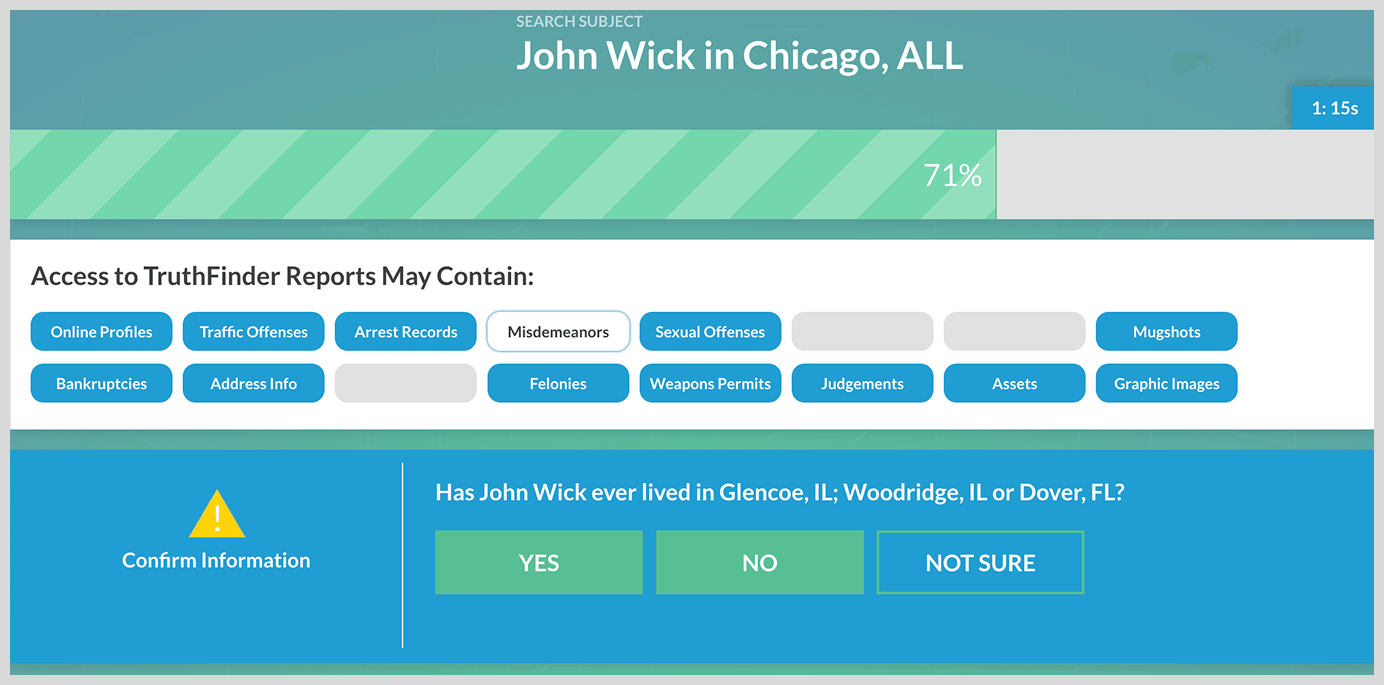
Step 3: A bit of drama
Now, here is something that many users have reported. The website sometimes uses very intense language and warning alerts during the loading phase.
You might see warning labels like “Reports may contain distressing images.” This may feel a bit alarming, but it is part of the process and does not really indicate that there will be anything shocking or distressing in your report. We still wanted to note as all this drama might be a little too much for someone who just wanted to do a quick background check for a potential candidate, for example.
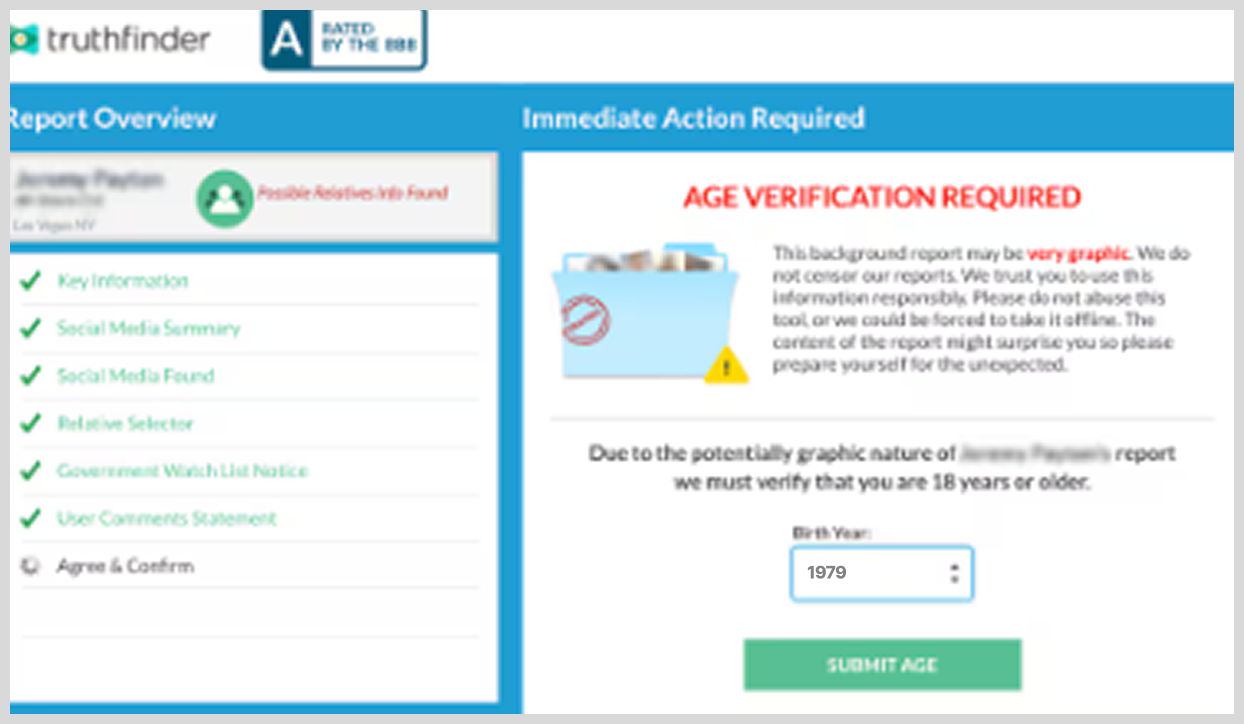
Step 4: Your report is almost ready
Once TruthFinder is done searching, it compiles the found information into a formatted report. To view it, they will ask for your email address and to accept their terms.
You can receive TruthFinder reports within minutes after the complete background check or search request. However, the background check speed depends on the complexity of the search and the system load. After compiling the report, users can access it for several days before it expires.
Before you could see the report, you must agree to a legal disclaimer that pops up on your screen. The disclaimer basically says that “You cannot use this information for credit, employment, or tenant screening.” Below, you have a screenshot of it.
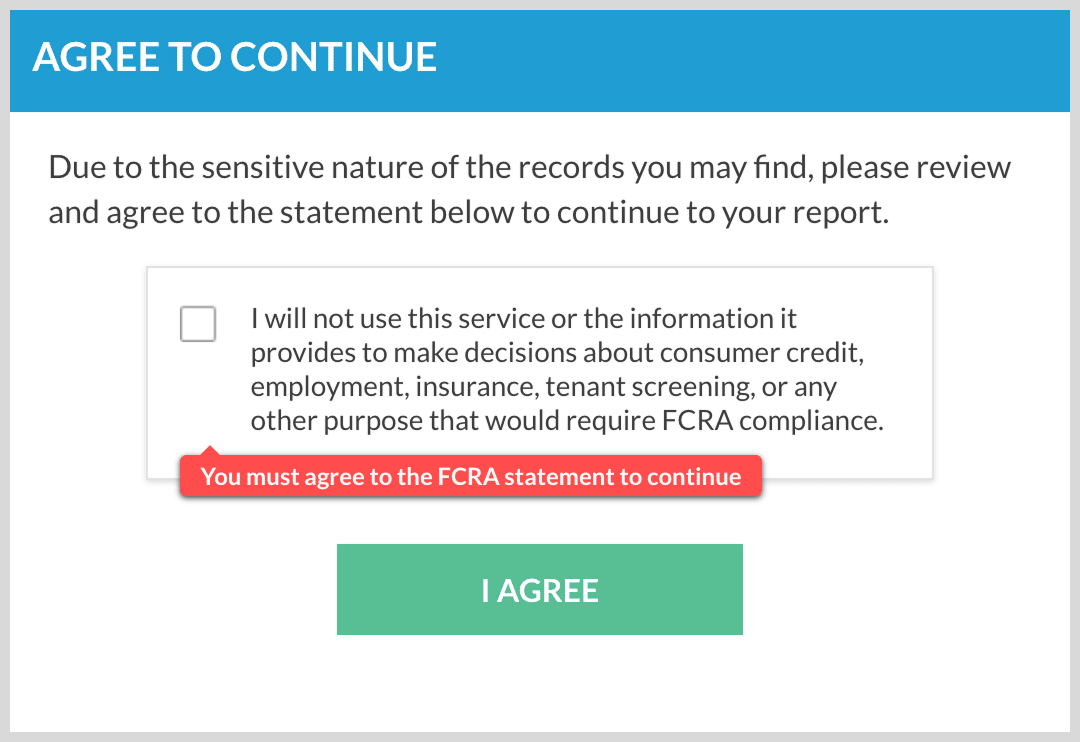
Step 5: Subscription
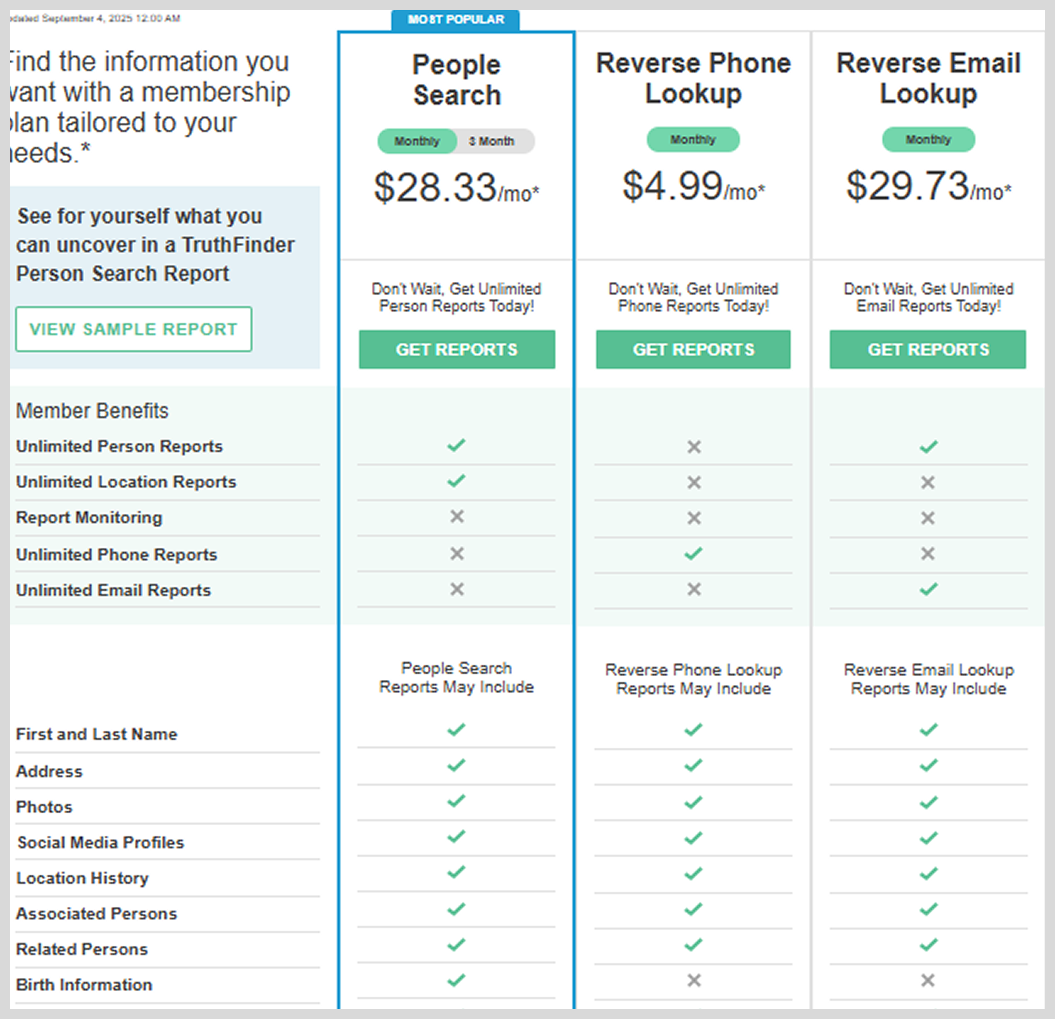
TruthFinder is a subscription-based service, and you can’t purchase just one report. You need to sign up for a monthly subscription to get your report. The subscription is starting from $4.99 to $29.73 per month. If you purchase more than a one month subscription, you get a discount.
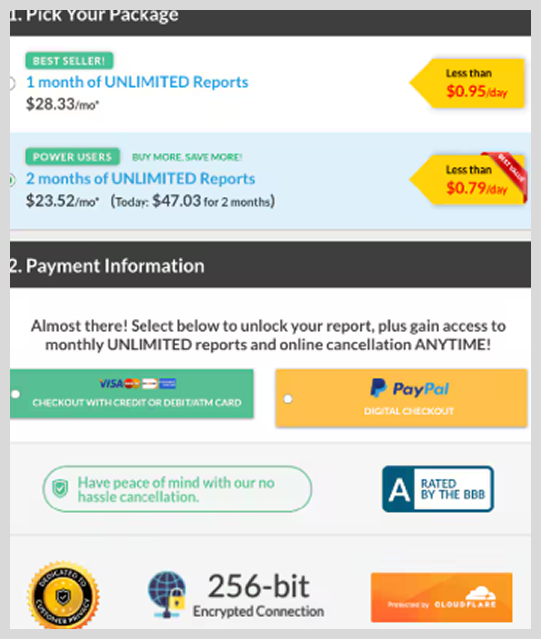
What information does a TruthFinder report really show
You can think of a TruthFinder report as a journey through someone’s online presence. It is an in-depth profile compiled from publicly available information from a wide range of sources. Each report will be specific to each individual, but here is a detailed description of the contents of a typical report:
Contact information & profile
- Full name and any known aliases or maiden names.
- Current and previous phone numbers.
- Current and previous home addresses.
Personal & family information
- Age and date of birth records.
- Marriage and Divorce info.
- Names of relatives or possible profiles of relatives or close associates.
Criminal & public records
- Criminal records and arrest history.
- Sex Offender Status (if available).
- Professional licenses and permits.
Life & lifestyle facts
- Job history & Educational history.
- Former and Current vehicle ownership details.
- Records of property and asset information (like houses owned).
- Social media and Dating profiles.
Remember, the information is only as current and true as the public records it is drawn from. Databases can be out-of-date or inaccurate, so think of the report by TruthFinder more as a guide for your curiosity, not a final word for any important decisions.
Can TruthFinder be trusted?
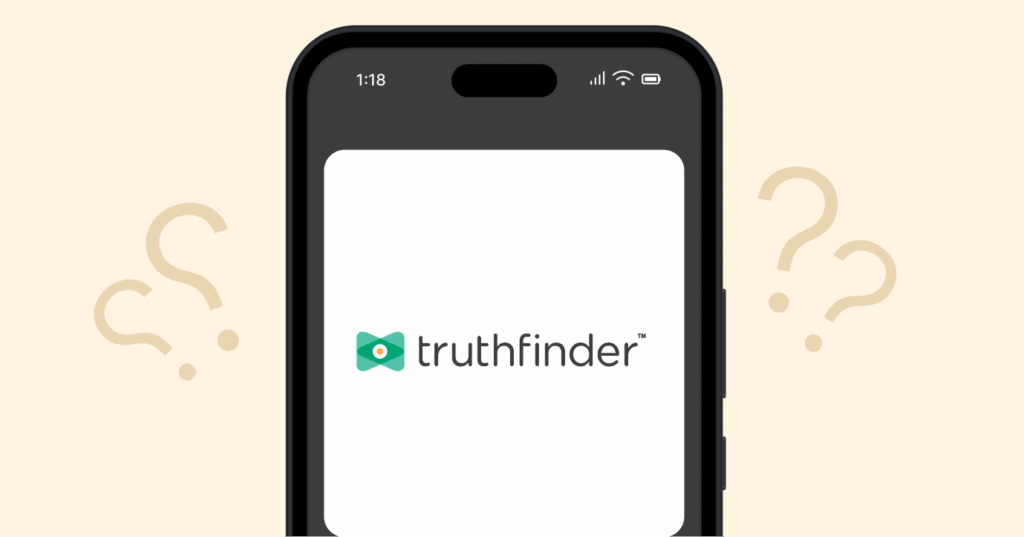
Well, the answer isn’t that simple. Trust is a strong word when it comes to TruthFinder; to put it simply, it’s complicated. Though they claim to give “detailed reports with real information about people,” there have been a lot of concerns about them.
1. Data accuracy concerns
Not everything you find in a TruthFinder report is 100% accurate. As we know, public records can contain errors, outdated information, and even mix up people’s names.
In September 2023, the Federal Trade Commission (FTC) penalized TruthFinder and Instant Checkmate (an affiliated company) for going against the Fair Credit Reporting Act. They had to pay a fine of $5.8 million for deceiving users by claiming their report was accurate.
This action revealed some serious concerns about TruthFinder’s business practices. The FTC found that the company:
- Lied about the accuracy of their report.
- Marketed reports for tenant and employment screening, which in fact violate FCRA rules.
- Did not verify the info on their reports properly.
- Use some misleading marketing tactics.
But being fined does not make them untrustworthy or a scam. It only means they had compliance issues, which they have since addressed.
Common accuracy problems you might sometimes encounter with TruthFinder include:
- Contact info or addresses may not be up-to-date.
- Mix-up of social media profiles of people with similar names.
- Attributing criminal records to the wrong person.
- Incomplete employment histories.
2. Privacy concerns
If you are using TruthFinder, the platform tracks and stores your searches. They will keep a record of who you have searched for, and law enforcement can access this record, or it might get exposed in a data breach.
3. Aggressive marketing tactics
Some users have complained that TruthFinder uses pushy sales tactics. Some also complain that they find it difficult to cancel subscriptions and receive refunds.
The company often uses emotional hooks during its marketing that can sometimes feel manipulative. They advertise a cheap “reverse phone lookup” but will need you to pay for a full membership before you can see the results.
4. Dispute resolution is limited
If, by chance, you find information about yourself that is not correct in someone else’s report, it is usually challenging and takes time to get them to correct it.
Even with these concerns, we can’t say with authority that TruthFinder is not trustworthy. When it comes to their dealings, especially their report delivery, they deliver the report they promise. You just have to keep a reasonable expectation when it comes to privacy and accuracy.
Also, we would advise you to always verify the information elsewhere before using it to make serious decisions.
As for the billing, you need to be very cautious and vigilant. Read every fine print.
Is using TruthFinder worth it?

Whether the service is worth it or not depends on what you are trying to accomplish and also how much money you are willing to spend.
TruthFinder might be worth it if you are
- Trying to reconnect with people: If you are trying to find your old friends, classmates, or even a long-lost relative, TruthFinder is worth giving a try. It can save you long hours of searching manually across multiple platforms.
- Dating safely: Want to verify the identity of someone before you meet them? Running a background check can save you a whole lot of headaches. It can reveal some red flags like criminal history or fake profile (this can save you from getting scammed).
- Neighborhood research: You can look up your potential neighbors and the crime patterns in that area just to be safe.
- Verify a mysterious caller: Have some strange numbers been bugging you with calls? Investigate them with TruthFinder to see if they are scammers.
- You can even use it to get a general idea of your own digital footprint.
When it’s probably not worth it
- Employment screening: Using TruthFinder to run a pre-employment background check is not worth it because doing so violates FCRA rules. Plus, TruthFinder reports aren’t accurate enough to base your hiring decisions upon, nor are they suitable enough for official purposes. We advise you to use a service that is FCRA-compliant.
- Tenant screening: This also has the same potential legal implications as employment screening.
- Stalking or harassment: Looking up people on TruthFinder just to know where they live and maybe harass them is illegal and may be dangerous.
- Casual Curiosity: Paying $30+ every month just to snoop and look up random people’s records to satisfy your curiosity is a waste, and it’s not worth it at all.
If you are on a tight budget and cannot afford to pay the recurring subscription fee, then TruthFinder is not worth trying for you. Instead, you can use freemium platforms like Whitepages or Zabasearch (offer a free version but with limited features).
Cost vs. benefit analysis
Depending on the plan you are going for, a TruthFinder subscription can go from $4.99 to $29.89/month. Most people may need to pay for a full membership, which is at the higher price point. Instead of paying such an amount monthly, you could hire a trained private investigator for specific cases or utilize several free resources.
However, if the reasons for running searches multiple times are legitimate, then the convenience might justify the cost.
How does TruthFinder affect your digital footprint?

While you are busy looking up other people with TruthFider, it will most certainly be keeping a file on you too. After all, your own personal data is also a part of the same public records ecosystem.
So every search you perform using TruthFinder becomes a part of your digital footprint. And it can, in a lot of ways, affect your privacy or even expose you to online scams.
Take a look at some of the information you are leaving behind online anytime you use TruthFinder and how they can affect your privacy:
1. Search history tracking
TruthFinder keeps detailed records of:
- Every person you’ve searched for.
- When you performed searches.
- Reports have you looked at and downloaded.
- Your payment and account information.
They will keep this information in their system for as long as possible unless you ask them to delete it. With proper warrants and legal documents, law enforcement can access this data.
2. Behavior profiling
Your search behavior says a lot about your interests, relationships, and activities. This data could serve the interests of:
- Marketing companies that build consumer profiles.
- Insurance companies assessing risk.
- Potential employers are conducting background research.
- Malicious actors who are planning social engineering attacks.
3. Third-party data sharing
TruthFinder claims they do not sell your personal information; however, its privacy policy doesn’t match the claim. Here’s what it states in its privacy policy.
- Service providers and business partners.
- Law enforcement, when deemed necessary.
- New owners if the company is ever sold.
Every time a service like TruthFinder scrapes and indexes this data, it is making your personal information easier to find, or possibly acquire, for anyone willing to pay.
It is a double-edged sword; you can easily find others because it’s convenient, but the convenience turns to a privacy nightmare, considering that you’re being searched, too.
Pro Tip: If you’re concerned about your own search history and data being tracked, using a Virtual Private Network (VPN) is a highly effective measure to protect your search privacy. A VPN encrypts your internet connection and hides your actual IP address that makes it much more difficult for your online activity—including your visits to sites like TruthFinder—to be traced back to you. For a detailed breakdown of the best options, see our guide on the best VPNs to use.
How do you remove your information from TruthFinder?

Finding your personal information on a platform like TruthFinder can be really unsettling, but you have the option to remove it. The process isn’t always easy, but it is most definitely possible if you persist.
But before we go on about removing your info, let’s tackle this part.
Why would your information appear on the platform in the first place?
As we have already said before, TruthFinder gathers data from public records, so most of your information comes from:
- Voter registration records
- Property ownership records
- Court filings and legal records
- Professional licensing data
- Birth records
- Social media profiles that are public
- Data broker networks, etc.
Since these are public records, TruthFinder has a legal right to compile and redistribute all of this information. They are required by law to offer opt-out options for those who want their information erased. Now, let us look at how you can remove your information from TruthFinder.
Step-by-step removal process
Step 1: Find your profile
- Go to TruthFinder’s website.
- Try different combinations of your name and city/state to find profiles that appear to be yours.
- Note all profiles/reports that you reasonably think are yours.
- Take screenshots of each of the profiles for your own record.
Step 2: Go to the opt-out page
Find a link that says something like “Remove My Information.” It’s usually located in the footer. If not, you may need to use their help center and search for “removal” or “opt-out.”
Step 3: Make removal requests
- Enter the URL of each profile you are requesting removal for.
- Type your full name and your aliases, if applicable.
- Enter your current and previous addresses and any provided.
- Submit an email address that you can access, where TruthFinder will send a confirmation email.
Step 4: Verify your identity
Then, you need to provide a photo of your driver’s license or any other ID and a selfie as proof that you are actually who you claim to be. This is for security purposes to prevent some random person from maliciously erasing your data.
The process might take up to 1-2 weeks before the verification is complete.
Step 5: Follow up
- Go back to the website in say 30-45 days to check if they have completed your request.
- Search for your name again to see if the profiles were really removed.
- Contact customer service if the profile or information appears on TruthFinder again.
Bear it in mind that this process only works to remove your data from TruthFinder. For you to reclaim your privacy completely, you’d need to repeat the opt-out with other people search sites like TruePeopleSearch.com, Spokeo, Checkmate, and BeenVerified.
Common removal obstacles
- Multiple listings: You might have various profiles with different name variations or addresses. Each will require a separate removal request.
- Processing delays: The removal process can take 2-8 weeks, even longer sometimes.
- Incomplete removal: You may still see some information exist even after a “successful” removal.
- Re-appearance: If they add any new public records, your information can reappear in their database.
Other options to remove your information
- Employ professional services: Companies like DeleteMe or OneRep can help remove your personal information from any data broker, including TruthFinder. It’s what they do.
- Seek legal assistance: If someone is harassing or stalking you, an attorney could send a cease and desist letter. This might be more effective in removing your information from the site.
- Direct source removal: You can remove the information directly at its source (voter records, social media, etc.) to keep it from ending up on future compilations.
How to prevent future appearances
After you have removed your information, consider the following ways to reduce future exposure:
- Register for voting using the minimum information they require.
- Public Records – If you can, use a P.O. box.
- Regularly review your privacy settings on social media.
- Be careful about the personal information you share; don’t overshare details about yourself online
- Consider freezing your credit reports to limit the exposure of your financial data.
Remember, you can’t completely remove any record from every single people search site since many records are public. With that said, you want to reduce exposure, thus making it more difficult for casual searches to find detailed information about you.
Is TruthFinder free?
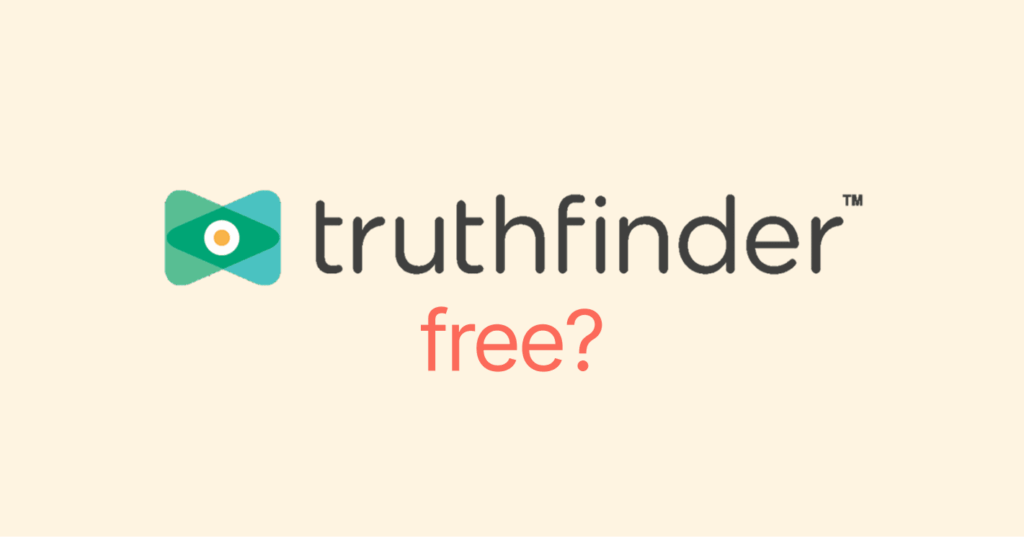
No, TruthFinder is not free. You can get its trial for $1 that lasts only for five days. This is basically the biggest misunderstanding when it comes to the service. People expect to get valuable, detailed background reports for free.
What the “free” search shows
When you first go to TruthFinder, you can input someone’s name and location to see if it has available information. What you can see in the first search is:
- Whether or not there are reports for that person.
- A generic overview of categories of available data.
- Teaser information, such as “Criminal Records Found” and “Social Media Profiles Available.”
The catch is that the detailed information does not display unless you subscribe to its services. Essentially, what you’re seeing is a preview to get you to subscribe.
Trial offers and pricing structure
TruthFinder usually has promotional trials, but these aren’t really “free”:
- $1 Trial (5 days): If you don’t cancel in 5 days, you will be charged $29.89 for a full monthly membership.
- Phone Plan Only: $4.99 a month for reverse phone lookup reports only.
- Full membership: $29.73 a month for unlimited access to every report type.
They have a very short trial period, and many people forget and fall victim to the auto-renewal billing starts when you don’t cancel after the trial. And this has led to a lot of complaints about charging consumers for the service unexpectedly.
Why TruthFinder is not free
There, possibly, are several reasons why TruthFinder does not provide a free service:
- Cost of data acquisition: Accessing and aggregating public records from thousands of sources does not come cheap. The platform has to invest heavily in technology and data partnerships.
- Cost of report processing: It takes resources to process raw public records into readable reports.
- Infrastructural costs: To run a platform that handles millions of searches requires costly servers and security.
- Cost of compliance: They need to meet certain legal and privacy obligations, and opt-out procedures require staff and systems to manage.
- Business sustainability: Like any company, TruthFinder needs some form of revenue to sustain and improve its business.
The fine print or hidden cost to watch out for
Apart from the monthly subscription, there are some additional costs you need to be aware of:
- The service may automatically renew subscriptions. Your subscription is only active until you cancel it – again, which may be difficult to do.
- Upgrade your plan. The service may encourage you to switch to a more expensive plan
- Difficult to cancel your service: Many users report that they had to call several times to cancel their accounts.
- They may use clever promotional emails and tricks to encourage you to reactivate your cancelled subscription.
Free TruthFinder alternatives

If the pricing on TruthFinder does not work with your budget, there are plenty of alternatives for finding information about people without the monthly price tag.
Completely free options
- Google search: Still the best and most powerful free tool for discovering information about people. Be sure to use quotes around names and add location details for better results. If you value your security, we recommend frequently deleting your Google search history. Our guide explains here how to do it.
- Facebook and social media: Many people post a lot of information about themselves publicly on social media.
- LinkedIn: A very useful place to start for professional and current employment information.
- WhitePages.com: Has minimal contact information and address history available for free only.
- Spokeo: Offers some free information, but you have to pay for the detailed reports.
- BeenVerified: Basically the same as TruthFinder, has some free preview info.
- Public records sites: Many countries and regions allow free access to records such as Court records, Property records, voter records, etc.
Government resources
- PACER: Federal Court Records (small cost per page).
- State Court Websites: Many states have free access to criminal and civil records.
- County Clerk’s Office: Property records, marriage licenses and divorces, etc.
- Sex offender registries: each state maintains a Public Safety database
- Professional licensing boards: can confirm Credentials for Doctors, Lawyers and any professional licensing.
Paid alternatives with potentially better value
- BeenVerified: Cheaper than TruthFinder and has similar features.
- Intelius: Usually priced competitively, it often provides a high-quality report at a fair price.
- InstantCheckmate: The same company that owns TruthFinder, but it has a higher price tag.
- PeopleLooker: A low-budget way to do some basic people search.
- Whitepages Premium: Less expensive than TruthFinder for simple contact information.
Specialized search tools
- Pipl: An impressive tool for finding someone’s social media profiles and their past online presence from environmental data.
- TinEye: A reverse image search to help reason and verify a person’s profile photo.
- Have I Been Pwned: To see if any of those emails for the person you are searching for have been spammed in a data leak.
- Wayback Machine: To find older formats of websites and social media profile pages for that person.
- Reddit and Forum earches: People share a lot of personal information in many online communities.
DIY Investigation Techniques
Sometimes, the best detective is you.
- Start what something you already know: Once you have a confirmed segment of info that you can begin to systematically expand around.
- Cross-reference multiple attributed sources: An empty threat, can you find something in at least two other places?
- Using Boolean search operators: Google has multiple methods to give better search results using the advanced Google.com search.
- Your mutual connections may help, too: People often talk about others to family, friends, and colleagues.
- Look for patterns: Advanced investigation may be troubling to its point; pay close attention as certain usernames, email utilization patterns, and personal information are consistent across platforms.
The trick is to use several free options instead of a single paid service. This approach will require more time and effort, but it will usually provide more detailed, accurate, and timely data than TruthFinder’s report can provide.
What to do when free options aren’t enough
Free options work reasonably well for basic information gathering, but they have their limitations:
- Manual searches take a lot of time.
- There is no guarantee you’ll find new information.
- It can be hard to organize a lot of scattered information.
- Limited access to a few types of records.
- No customer support when you hit a dead end.
If you’re only searching occasionally, free options are probably adequate. But if you’re running recurring background searches or want reports in a professional format, a paid service may be the best option.
Does TruthFinder notify the person you’re searching?

One of the biggest concerns people who use background check services often have is whether the person they are searching for will find out. In short, TruthFinder won’t directly tell the person that someone is conducting searches on them.
Your searches are private and won’t be listed anywhere in the person’s report, and are not visible to the public. So even if they do find out that their profile is on TruthFinder, they won’t know it was you who searched. TruthFinder won’t send any email, letter, or any form of alert to let them know you have looked them up. So rest assured, your curiosity remains your secret.
But here are indirect ways someone might find out they’ve been searched:
- Security breaches on accounts: If TruthFinder’s systems were to ever get compromised, the attackers might sell the search logs or they will be leaked online, where everyone can see them.
- Sharing devices with someone: If you, by any chance, give your device to that person, they may see it in your browser history.
- Email confirmations: TruthFinder sends confirmations of your search to your email. If someone has access to your email account, they might see these email notifications.
- Credit card statements: Your monthly subscription will show up on your credit card or bank statements.
- Your careless behavior: Screenshots, saved reports, or telling someone about a search may give away that you searched.
What TruthFinder sees about you
TruthFinder won’t notify the person you want to search about your search to them, but it tracks a lot of data about your searches to build a profile of your search behavior:
- Your complete search history, including dates and times.
- The IP address and location of the search.
- Billings and payment account info.
- Downloaded reports and viewed activities of profiles.
- How and when you created an account and last logged in.
They will often store your data, and if there is reasonable cause, law enforcement could request access to it with warrants or subpoenas.
TruthFinder reviews & complaints from users
Like any other tool or company online, TruthFinder is not without its issues. And reading user experiences from many different sources, rather than just the company-provided testimonials, is the most sensitive way to gauge legitimate users’ opinions.
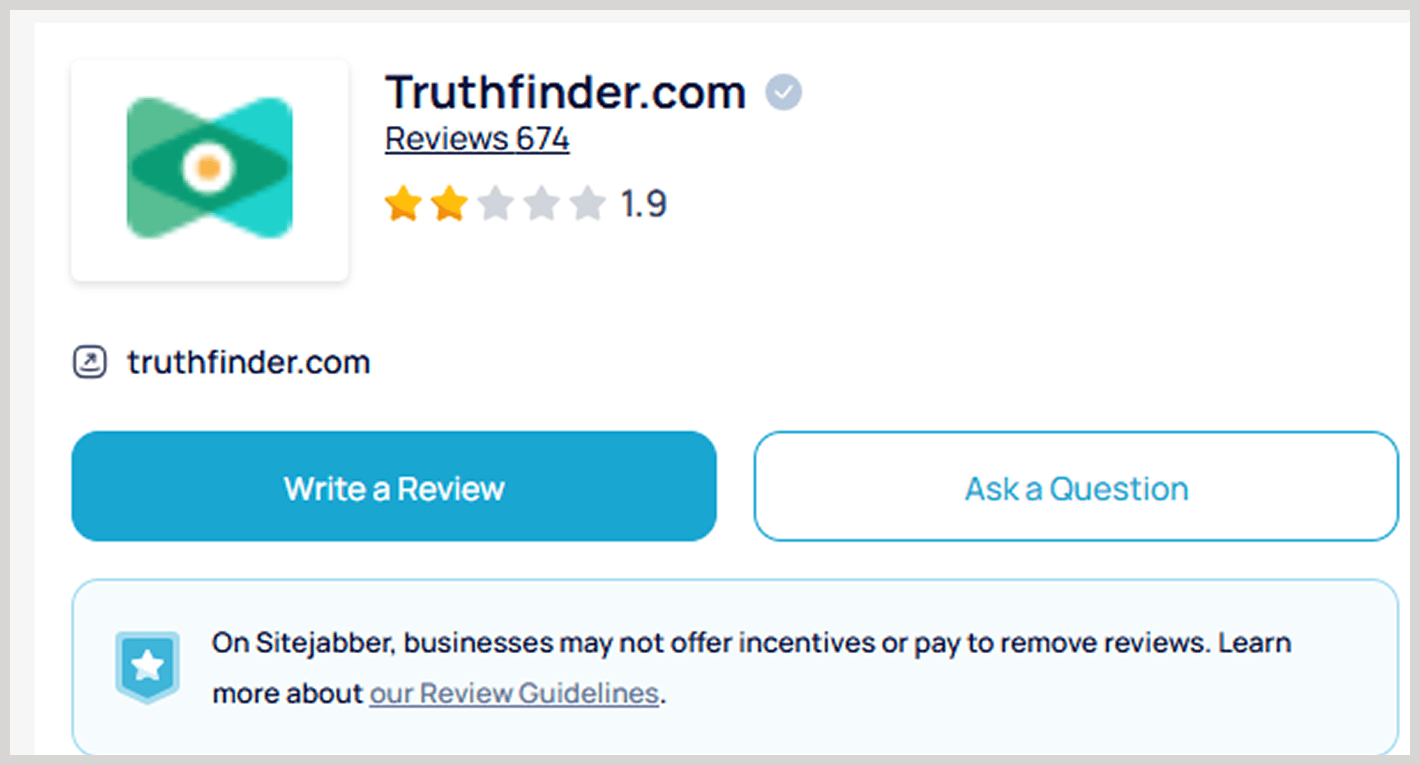
The search platform has a rating of 1.9 stars from 674 reviews on Sitejabber, showing that a lot of customers were not really satisfied with their experience. The picture of user satisfaction this paints is really concerning.
Common TruthFinder complaints from users
1. Billing and cancellation issues
This type of complaint is by far the most common in user reviews, especially on platforms like TrustPilot. Users with these complaints shared a variety of concerns, such as:
- Difficulty cancelling subscriptions.
- Unexpected charges after trial periods.
- Being charged even after cancelling (what the users believed to be cancelling).
- Being told they cannot get a refund, and after all the time spent on the phone for customer service, getting the runaround.
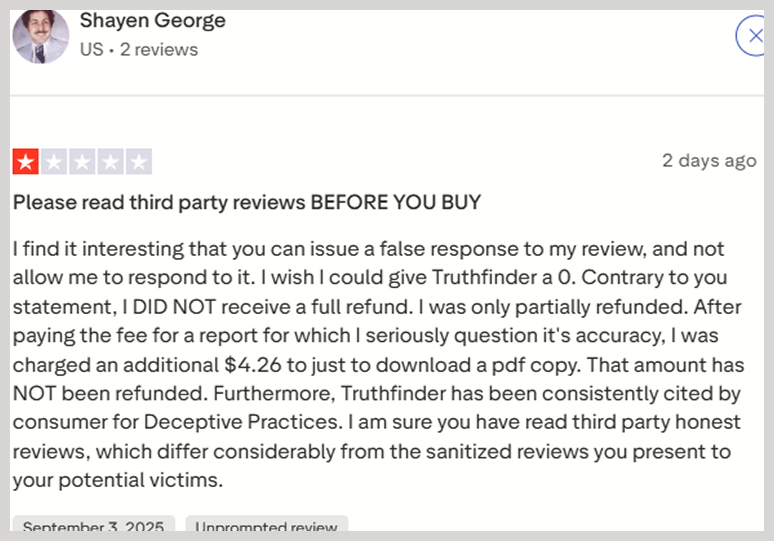
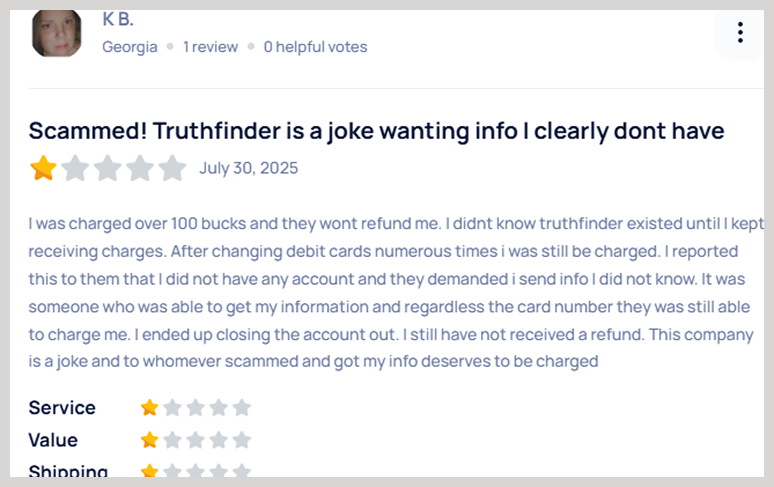
2. Inaccurate or outdated information
It is another common issue with some users that the reports contain:
- The wrong address and the wrong phone number.
- Outdated employment information.
- Criminal records for people with the same name.
- Social media profiles for someone entirely different.
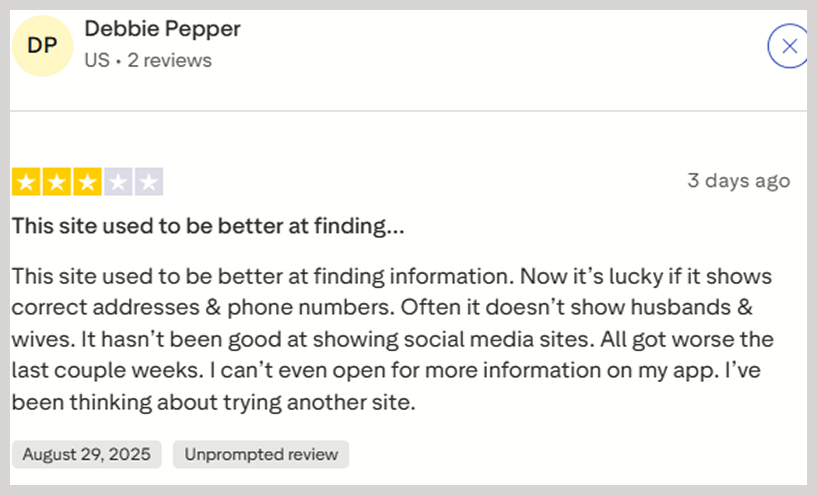
3. Misleading marketing
Customers felt misled over a variety of concerns relating to:
- False “comprehensive” reports that were not, in fact, comprehensive at all.
- Advertising made it look like some services were free when there were charges (users felt lied to).
- Pesky Marketing tactics.
- Over-promising/reporting on the depth and quality of the available data.
4. Bad customer service
Several users complain that TruthFinder’s customer service is very poor and less responsive:
- Waiting for long amounts of time to get support.
- Unhelpful representative who cannot resolve issues.
- Repeatedly transferring the user back and forth without solving anything.
- Having a rep read off a script and never truly resolving the users’ concerns.
Positive reviews and examples of use
Even with all the complaints, some users have also had positive things to say about TruthFinder:
- Successful reconnections: Many say they have successfully reconnected with their long-lost friends, family members, and former colleagues with the help of the search tool.
- Dating safety verification: Some people feel more encouraged to meet their online dates after conducting background checks.
- Property research: Real estate investors and home buyers have found it useful in researching a neighborhood or the history of a property.
- Professional networking: Business professionals have stated that they use TruthFinder to find the current contact phone numbers for potential clients or partners.

User feedback red flags
Some clear patterns in the reviews suggest systematic issues:
- Fake positive reviews: Some of the very positive, overly excited reviews on TruthFinder’s own website look suspiciously fake or generic.
- Sustained complaints about billing: The volume of complaints about billing is enough to suggest that this could not have happened only a few times, but possibly a problem with the company’s business practices.
- Bad faith responses by the company: TruthFinder seems to blame the user in many of its responses to negative reviews rather than owning up to real concerns and finding ways to resolve them.
- Enforcement actions: The FTC’s $5.8 million fine supports many of the accuracy and marketing complaints users have been making for years.
How to critically evaluate reviews
When reading TruthFinder reviews, always consider:
- Where is the review sourced from? The company may have screened the reviews left on its website, so it’s not wise to base your judgment on those. Instead, look for reviews on third-party review sites or forums like Reddit, Quora, etc. These provide unbiased and legitimate reviews.
- Are there specific details provided in the review? Both positive and negative reviews that are vague are less trustworthy than reviews that have specific examples and dates.
- When was the review left? More recent reviews are more relevant than several years ago, especially with recent regulatory changes.
- Are there patterns present? A review with a single complaint could be an outlier, but if a bunch of reviews have consistent patterns, then there could be a systematic issue at play.
Often times a person who has an extremely positive or negative experience is much more likely to leave a review than a person who has an average experience.
What reviews tell us about TruthFinder
The overall picture from the user reviews suggests that TruthFinder:
- Delivers real information; however, quality and accuracy are very variable.
- Has actual billing and customer service issues that impact many users.
- It is better for particular types of searches (contact information) than it is for others (full-blown background checks).
- It may not be worth the costs for occasional or one-off searches.
- Has unexpected recurring costs, and users need to be diligent about subscription management. To avoid unwanted charges.
FAQs
The accuracy of TruthFinder reports varies greatly. Some will have old contact details, erroneous criminal history, or switched social media profiles. When the Federal Trade Commission enforced regulatory action against TruthFinder, they cited specific accuracy concerns as a primary issue.
No, candidates are not notified when someone searches them on TruthFinder. Your searches are anonymous, from the target person’s viewpoint, but TruthFinder does retain a record of all search activity.
It is legal to use TruthFinder for personal use, but it is illegal to use the reports for employment screening, tenant screening, or any other purposes regulated under the Fair Credit Reporting Act (“FCRA”). Always verify local laws before running any background searches.
You can cancel online in your account settings or by speaking to their customer service. Many users report issues with canceling. You should document the request to cancel your membership and ask to confirm that they have processed your request for cancellation.
The only cost is the monthly subscription fee, but be cautious of automatic renewals and the difficulty in canceling your membership. Some users report continuing to be charged for the membership after having canceled their membership.
TruthFinder does not specify how often it updates; however, public records can be old by months or even years by the time they get to the reports from the public records. You should not expect timely information or real-time updates, so verify any important information through other sources as well.
Yes, TruthFinder has an opt-out process to remove your personal information from its database. Go to the opt-out page on its website and follow the instructions for removal. The whole process can take anywhere from 2-8 weeks to complete.
